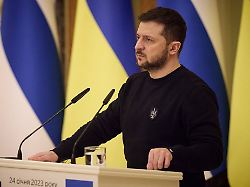In addition to the situation on the front, several corruption scandals have made the headlines in Ukraine in recent days. Experts see this as a positive signal. The current cases show that Kiev’s government is on the right track in its efforts to move closer to the EU.
The Ukrainian government is currently dealing with several corruption cases. It began at the weekend when an investigation revealed that the Ministry of Defense had bought some food for soldiers at inflated prices. A day later, another scandal became public: Deputy Industry Minister Wassyl Losynskyj is said to have received a 400,000 US dollar bribe for the purchase of generators to deal with the energy crisis in the country. Losynskyj was arrested and released.
Careers also end in other departments. Deputy head of Ukraine’s presidential office Kyrylo Tymoshenko was fired today, Tuesday, after he was spotted driving an SUV donated for use at the front. The official had defended his trips as official, but still applied for his dismissal. A few hours later it was also announced that five governors and four deputy ministers had also been relieved of their offices.
Some experts regard the current corruption scandals as a positive sign for Ukraine. The fact that alleged cases of self-enrichment are being discussed publicly and that they are being uncovered is already progress in the fight against corruption. The cases do not necessarily show that there is more corruption, but primarily that it is being fought against.
“A process of purification is taking place”
“The current scandals make it clear that a process of purification is taking place,” says Tetiana Shevchuk Anti Corruption Action Center in conversation with ntv.de. The Ukrainian NGO was founded in 2012 with the aim of fighting corruption in the country. “President Zelenskyy is sending a signal to society that he will not tolerate corruption, including in his office,” Shevchuk said, referring to Tymoshenko’s resignation.
The President said so directly a few days ago: “I want this to be clear: there will be no return to what was in the past, to the way in which various people close to state institutions , or those who have spent their whole lives chasing an office, have lived”
By the past Zelenskyj means a time that is not very long ago. In 2021, Transparency International’s Corruption Index ranked Ukraine 122 out of 180. In Europe, only Russia performed worse. The next index is scheduled to appear at the end of January. In an interview with ntv.de, Oleksandr Novikov from the anti-corruption authority NACP was certain that Ukraine would make a big leap forward. There are several reasons for this assumption.
Fight against corruption also takes place during war
On the one hand, the government in Kyiv is pushing ahead with its anti-corruption efforts even during the war. The competent public prosecutor’s office reported at least 109 charges in 42 cases and 25 convictions in December. Ukraine, which has been a candidate for EU membership since June last year, urgently needs to convince both Brussels and Western financiers that investments will not seep down dark channels, as a high-ranking member of the responsible committee in the Ukrainian parliament, Yaroslav Yurchyshyn, said. said a few weeks ago.
In mid-January, Kyiv completed the appointment of a judiciary supervisory body – an important step in the reforms called for by the EU for possible accession. Kyiv had already adopted an anti-corruption strategy in June. The relevant law envisages a democratic and sustainable reconstruction process for Ukraine, based on the rule of law and excluding corruption.
“Corruption is now perceived as looting”
Society’s attitude towards corruption has also changed since the beginning of the war. While in the past the population paid less attention to individual cases due to the wide spread, during the war people react more sensitively to the injustice. According to Oleksandr Novikov from the anti-corruption authority NACP, the will to fight against this has increased significantly in the past year. “Before the war, only 44 percent were willing to join our anti-corruption goals. Today it is 84 percent, more than ever before,” said Novikov in an interview with ntv.de.
Tetjana Shevchuk from the Anti-Corruption Action Center also observes that the demand for justice has grown significantly during the war. “As a result of Russian aggression and war crimes, people experience a lot of injustice. There is a right to justice in terms of punishing the aggressor. This also carries over into everyday life,” explains Shevchuk. “Corruption is now perceived as plunder. Basically, it’s also a kind of plunder. That’s why the population is angry at corrupt officials.” The activist explains that even before the large-scale attack by Kremlin troops, the population named corruption as the country’s second biggest problem – after Russia’s aggression in Donbass and Crimea.
Similar corruption case in Russia went unpunished
According to Shevchuk, the systematic fight against corruption began after the 2014 revolution. At that time, Ukraine decided to build anti-corruption institutes and completely change the system of government. Since then, Ukraine has been taking a path independent of Russia when it comes to fighting corruption. An example shows how successful this is compared to its larger neighbor.
As is now the case in Ukraine, a corruption scandal involving military rations was uncovered a few years ago in Russia. As the opposition politician Alexei Navalny and his anti-corruption foundation found out at the time, most of the orders went without a tender to the oligarch Yevgeny Prigozhin, also known as “Putin’s cook” because of his closeness to Kremlin chief Vladimir Putin. The revelations had no effect. Today, as head of the Wagner mercenary group, Prigozhin is one of the most important pillars of the aggressive war against Ukraine and one of the most powerful men in Russia. Alexei Navalny, on the other hand, has been in prison for more than two years.
